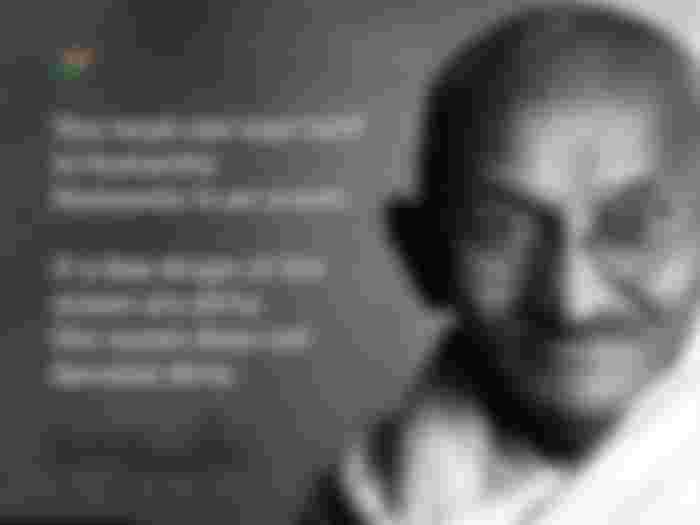When we think of India, we think of yoga, meditation, Indian saris and the epic “Mahabharata and Ramayana”. But there is also the great humanist Mahatma Gandhi.
Mohandas Karamchand Gandhi, born into a middle-class family in the coastal town of Porbandar (Gujarat), was a very ordinary boy, an averagely intelligent student and law student.

Born in India, he trained as a lawyer in Britain in his youth, and later lived in South Africa where he started the civil rights movement of Indian immigrants.
The term "Gandhism" defines a specific socio-political and religious-philosophical thought that has long since crossed the borders of the Indian subcontinent. His followers are still found in many parts of the world, especially in Asia and Africa. Gandhi's contribution to humanity cannot be measured in words. His religious, political and philosophical ideas were an inspiration to millions of people. Perhaps the ones that are most remembered and most often mentioned are the fight against non-violence, the truth as the only criterion and gender equality.

The topicality of the content "Fight against non-violence" can still be a stimulus to young generations; the life and work of a great peacemaker and humanist are an example of perseverance and mental strength.
After completing his law studies in 1891 (1889-1891), Gandhi returned to India and tried to work in the profession, but was unsuccessful. Two years later, an Indian company that had business relations with South Africa hired him as its legal advisor at an office in Durban.
When he came to Durban Gandhi he discovered that there he was considered a member of a lower race. At the same time, he was stunned by the denial of the civil and political freedoms of Indian immigrants in South Africa. This prompted him to join the struggle for recognition of basic human rights for Indians. Gandhi remained in South Africa for 20 years, often spending time in prison.

Deeply concerned about racism against Indians, he took over the leadership of the "Indian National Congress" in 1921 and reorganized it - across the country he organized campaigns and aid for the poor, to strengthen women's rights and promote a peaceful religious and ethnic environment. He was always on the side of workers, peasants and the poor. He would often clash with indigo plantation owners who exploited workers and organized canteens, sanitation and schools for children in the villages. Such successful examples of his rebellion encouraged peasants across India to initiate similar actions. Gandhi's political philosophy was based on the belief that there was a "greater good" for a society that demanded that every individual sacrifice himself.
Gandhi believed that by nonviolent methods he would show the British that the use of violence was useless and that they would then leave India. Gandhi's political and spiritual influence on India became so great over time that the British authorities did not dare to take any countermeasures against him.

In 1944, the Indian struggle for independence came to its final stage, the British government agreed to the independence of India on the condition that two opposing nationalist groups: the Muslim League and the Congress Party, resolve their differences. Gandhi vehemently opposed the division of India into two states (as demanded by the Muslim League), but in the end still had to agree hoping that peace between the two religious groups would be achieved once Muslims satisfied their separatist aspirations. India and Pakistan became separate states when the British recognized India's independence in 1947.

On January 30, while on his way to the place where he was performing the evening prayer, he was attacked and killed by Nathuram Godse, a Hindu fanatic. Gandhi’s death was experienced around the world as a disaster. He lived the spiritual and ascetic life of a preacher, often spending time in meditation. Refusing any possession of material goods, he dressed in the traditional clothing of the poorest Indians and ate only vegetables, fruit juices, and milk. The Indians proclaimed him a saint and began to call him Mahatma (in Sanskrit: great soul), a name intended only for the greatest sages. Gandhi’s commitment to nonviolence, also known as ahimsa (Sanskrit: non-injury), was an expression of the life path preached by Hinduism.

Wisdom and perseverance took him far, he was remembered as a man who changed the world.








Gandhi was nominated for the Nobel Peace Prize in 1937, 1938, 1939 and 1947, but never received this award, which was first awarded in 1901. He was also nominated in 1948, the same year he was killed, but the Nobel Commission decided not to award him the posthumous prize. Instead, the committee announced that there were no suitable living candidates and that year the winner was not named. The American civil rights activist and winner of the Nobel Peace Prize in 1964, Martin Luther King Jr., paid tribute to Gandhi in his speech of gratitude, while the fourteenth Dalai Lama, winner of the Nobel Peace Prize in 1989, dedicated the prize to his mentor, Mahatma Gandhi. In 2006, the Nobel Prize Committee publicly expressed regret that Gandhi had never received the prize.